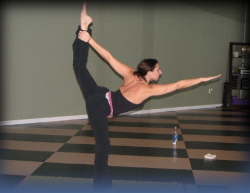by Answer is Fitness on April 23, 2013
 Last week was school vacation week in Massachusetts. It was supposed to be relaxing, but as it turns out, the Boston area had one of its most stressful weeks ever. How you respond to stress can determine how it affects you. The goal is to find a healthy and productive balance that allows you to manage and enjoy life. Adopting a yoga practice as part of your stress management routine is an extremely effective tool in helping you do just that.
Last week was school vacation week in Massachusetts. It was supposed to be relaxing, but as it turns out, the Boston area had one of its most stressful weeks ever. How you respond to stress can determine how it affects you. The goal is to find a healthy and productive balance that allows you to manage and enjoy life. Adopting a yoga practice as part of your stress management routine is an extremely effective tool in helping you do just that.
Yoga and Stress
Stress can affect you through exhaustion, lethargy, depression, headaches, change in appetite, irritability, insomnia, high blood pressure, heart disease, body aches and pains, poor concentration, anxiety, anger, or aggression. Yoga is a practice of physical postures or poses, meditation and breath control, and has been shown to have a positive impact on the management of stress and all of its effects.
There is a popular misconception that you have to be athletic, flexible or bendy, strong and thin to “do yoga.” The fact is that anyone, at any age and in any physical condition, can practice yoga. In fact everyone’s yoga practice may appear different from anothers.
Yoga is a deeply personal practice that may be profoundly spiritual and transcendent. The biggest challenge of yoga is in choosing to practice and in making your practice appropriate and challenging for you, not the person on the mat next to you.
Yoga and the Nervous System
The sympathetic nervous system (SNS) and the parasympathetic nervous system (PNS) act in powerful and opposing ways. The SNS gets you excited, increases your heart rate and elevates your blood pressure, focuses your concentration and allows you to aggressively respond to a challenging stimulus. The PNS “puts the breaks on” and slows you down, resulting in a state of relaxation and calm and allowing you to retreat from or avoid a situation that feels overwhelming. People who have a dominant SNS tend to be aggressive responders, spending a lot of their life with the “pedal to the metal.” Those with a predominant PNS tend to avoid conflict, retreating from life’s challenges.
Yoga balances both halves of your nervous system without becoming too agitated and aroused or too overwhelmed and avoidant. In this way, it’s possible to consciously affect and change the way you habitually perceive and respond to stress.
Yoga is About the Breath
The most important focus of yoga is the breath. The breath, or “prana,” leads the physical practice. The poses the body assumes are achieved mindfully and purposefully in rhythm with inhalation and exhalation as the yogi skillfully engages his or her body in challenging poses.
The physiologic effect of inhaling is to activate the SNS, resulting in a slightly increased heart rate and state of arousal. Exhalation has the opposite effect, stimulating the PNS and causing a slight decrease in heart rate and a calming effect. Yoga improves the practitioner’s ability to move between both states.
Studies have shown definitively that a 6-week yoga program improves the balance and flexibility of the nervous system. Those who practice yoga also have significantly enhanced physical strength, balance, flexibility and sense of well-being. The equanimity that grows out of a consistent and dedicated yoga practice becomes an invaluable tool that will benefit you daily.
For more information on yoga practices at Answer is Fitness, contact us.
Metro
< Go Back to Blog


 Last week was school vacation week in Massachusetts. It was supposed to be relaxing, but as it turns out, the Boston area had one of its most stressful weeks ever. How you respond to stress can determine how it affects you. The goal is to find a healthy and productive balance that allows you to manage and enjoy life. Adopting a
Last week was school vacation week in Massachusetts. It was supposed to be relaxing, but as it turns out, the Boston area had one of its most stressful weeks ever. How you respond to stress can determine how it affects you. The goal is to find a healthy and productive balance that allows you to manage and enjoy life. Adopting a 


